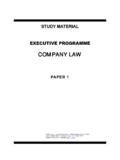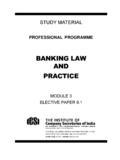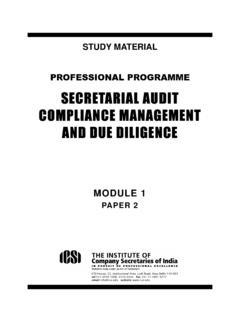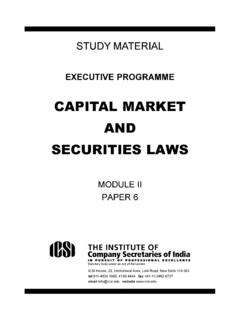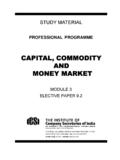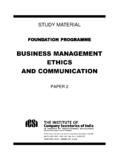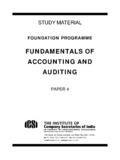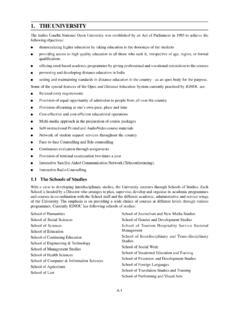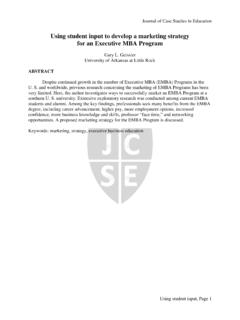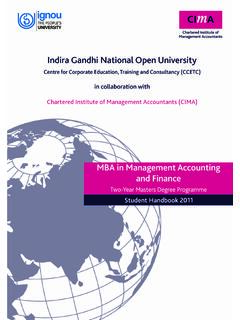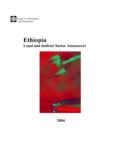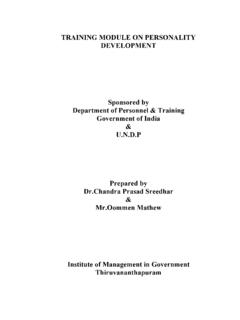Transcription of COMPANY ACCOUNTS AND AUDITING PRACTICES
1 ISTUDY MATERIALEXECUTIVE PROGRAMMECOMPANY ACCOUNTSANDAUDITING PRACTICESMODULE IIPAPER 5 ICSI House, 22, Institutional Area, Lodi Road, New Delhi 110 003tel 011-4534 1000, 4150 4444fax +91-11-2462 6727email THE INSTITUTE OF COMPANY SECRETARIES OF INDIATIMING OF HEADQUARTERSM onday to FridayOffice Timings to Dealing TimingsWithout financial transactions to financial transactions to , Typesetting by AArushi Graphics, Prashant Vihar, New Delhi, andPrinted at M P Printers/10000/February 2013iiiiiEXECUTIVE programme COMPANY ACCOUNTS ANDAUDITING PRACTICESF inance and accounting have assumed much importance in today s competitive world of business wherein corporateorganisations have to show the true and fair view of their financial position.
2 Thus, the application of accounting inthe business sector has become an indispensable factor. COMPANY Secretary has to provide the complete andaccurate information about the financial operations of the COMPANY to management for decision making. Thisemphasizes that the books of account are to be maintained accurately, up-to-date and as per the subject COMPANY ACCOUNTS and AUDITING PRACTICES is very important for the students. In the course of hiswork, a COMPANY Secretary is expected to have the working knowledge of COMPANY ACCOUNTS . He should alsohave the working knowledge of AUDITING concepts such as verification, vouching, and internal control.
3 This willhelp a COMPANY secretary in carrying out his duties in a more professionalized manner. The entire paper hasbeen discussed in fourteen study lessons. In starting nine study lessons we have discussed about the ShareCapital, Debentures, Final ACCOUNTS of Companies, Corporate Restructuring, Consolidation of ACCOUNTS , Valuationof Shares and Intangible Assets, Liquidation of COMPANY , Corporate Financial Reporting and AccountingStandards. At last five lessons, we have discussed about AUDITING Concepts, types of COMPANY Audit, InternalControl and its Review, Audit engagement and this study every efforts has been made to give a comprehensive coverage of all the topics relevant to thesubject.
4 In all study lessons the requisite theoretical framework for understanding the practical problems in thesubject has been explained and wherever necessary practical illustrations have been given to facilitate betterunderstanding. At the end of each study lesson a brief about the lesson have been given under the caption Lesson Round Up as well a good blend of theoretical and practical questions have been given under thecaption Self Test Questions for the practice of students to test their knowledge. In fact, this being a practicalpaper, students need to have good theoretical knowledge and practice to attain the requisite proficiency study material has been published to aid the students in preparing for the COMPANY ACCOUNTS and AuditingPractices paper of the CS executive programme .
5 It is part of the education kit and takes the students step bystep through each phase of preparation stressing key concepts, pointers and procedures. COMPANY Secretaryshipbeing a professional course, the examination standards are set very high, with emphasis on knowledge ofconcepts, applications, procedures and case laws, for which sole reliance on the contents of this study materialmay not be , in order to supplement the information/contents given in the study material , students are advised torefer to the Suggested Readings mentioned in the study material , Student COMPANY Secretary, Business Dailiesand the event of any doubt.
6 Students may write to the Directorate of Academics and Professional Development inthe Institute for clarification due care has been taken in publishing this study material yet the possibility of errors, omissions and/or discrepancies cannot be ruled out. This publication is released with an understanding that the Institute shallnot be responsible for any errors, omissions and/or discrepancies or any action taken in that there be any discrepancy, error or omission noted in the study material , the Institute shall be obliged ifthe same are brought to its notice for issue of corrigendum in the Student COMPANY Secretary.
7 IvSYLLABUSMODULE 3 PAPER 5: COMPANY ACCOUNTS AND AUDITING PRACTICESL evel of Knowledge: Advance KnowledgeObjective:To acquire knowledge and understanding of the concepts, principles and PRACTICES of companyaccounts and AUDITING in accordance with statutory : COMPANYACCOUNTS (70 MARKS)1. Share Capital Issue of Shares: at Par, at Premium, at Discount, on Conversion and for consideration other thanCash; Forfeiture and Re-issue of Shares, Buyback of Shares, Redemption and Conversion of PreferenceShares, Bonus Shares, Rights Issue, ESOPs, ESPS, Sweat Equity Shares Alteration of Share Capital Underwriting of Issue of Debentures.
8 At Par, at Premium, at Discount and for consideration other than Cash Accounting Treatment and Procedures Redemption of Debentures Conversion of Debentures into ACCOUNTS of Companies Conceptual Framework, Preparation and Presentation of Financial Statements, Schedule VI,Interpretation and Scrutiny of Balance sheet Treatment of Profit Prior to Incorporation, Preoperative and Preliminary Expenses Preparation of Final ACCOUNTS under COMPANY Restructuring Concept and Accounting Treatment as per AS Methods of Amalgamations Accounting The Pooling of Interests Method The Purchase Method Consideration Treatment of Reserves, Goodwill and Pre-Acquisition & Post-Acquisition Profit Accounting in the books of Transferor and Transferee Merger and De-merger Acquisition of Business Internal of ACCOUNTS Holding and Subsidiary Companies - Accounting Treatment, Disclosures and Consolidation of of Shares and Intangible Assets Valuation of Shares.
9 Methods of Valuation, Price Earning Multiple Valuation, Discounted Cash Flow(DCF) Method Valuation of Intangibles: Brand, Goodwill and of COMPANY Preparation of Statement of Affairs including Deficiency /Surplus Financial Reporting Various Requirements of Corporate Reporting Value Added Statements: Economic Value Added (EVA), Market Value Added, Shareholders Standards Relevance and Significance National and International Accounting Standards and Authorities Adoption, Convergence and Interpretation of International Financial Reporting Standards (IFRS) andAccounting Standards in IndiaPART B.
10 AUDITING PRACTICES (30 MARKS) Concepts Nature, Scope and Significance of AUDITING Basic Principles Governing an Audit Overview of AUDITING and Assurance Standards- National and of COMPANY Audit Statutory Audit Internal Audit Branch Audit Joint Audit Special Audit CAG Audit Forms of Audit - Propriety Audit, Compliance Audit and Efficiency Audit Nature, Scope and Techniques of Internal Audit; Functions and Responsibilities of Internal Auditors;Organisational Status of Internal AUDITING Function, Internal Audit vis- -vis Statutory Control Nature, Scope And Elements Internal Control distinguished from Internal Check and Internal Audit Techniques of Internal Control System, Flow Charts, Internal Control Questionnaires Steps for Internal Control and Audit Evaluation Audit Testing Need For Sampling and Various Approaches to Statistical Sampling Inter-Firm and Intra-Firm Comparisons Ratio And Trend Analysis.

